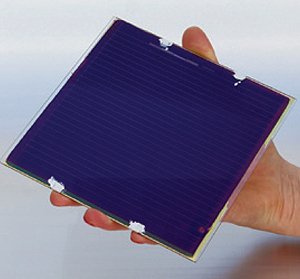 Imagine a world where each family residence produces the energy it consumes at lower prices than today’s. Imagine a world with free CO2 residence energy, more sustainable and more integrated into the natural world. GOTSolar has this ambition, make buildings 100 % energy grid free for a more sustainable world!
Imagine a world where each family residence produces the energy it consumes at lower prices than today’s. Imagine a world with free CO2 residence energy, more sustainable and more integrated into the natural world. GOTSolar has this ambition, make buildings 100 % energy grid free for a more sustainable world!
Perovskite solar cells are a new comer in the field of photovoltaic cells – in 2009 the best device has an energy efficiency of 3.8%; in 2018 GOTSolar's partner Prof. Michael Grätzel (EPFL) announced a top efficiency of 23.25%! No other technology evolved that fast.
A perovskite solar cell (PSC) is 1μm thick and the light absorber layer, an organic-metal perovskite semiconductor, is just 400nm thick! PSC are made of abundant materials and can be produced easily, incorporating a minimal amount of energy and natural resources; they promise then to revolutionize again the photovoltaic world. Some critics point out the presence of lead in the perovskite composition. However, its concentration is rather small, below 0.1 wt.%, fitting the EU regulations on this matter.
GOTSolar promoted several landmark developments. Among them we would like to emphasize:
- Fundamental properties of the absorbing materials were investigated both theoretically and experimentally. A modelling of halide perovskites with a universal empirical tight-binding Hamiltonian was developed to describe the optoelectronic properties of lead-halide perovskites;
- A new and modified electron selective layers (ESL) were developed depositing a thin layer of amorphous SnO2 (a-SnO2) onto mesoporous-TiO2 using solution based approaches. These modified ESL hold a great potential for their application in the fabrication of highly-efficient PSCs, which are stable under ultraviolet irradiance, a challenge originally posed to the PSCs based on mesoporous-TiO2;
- The development of a dopant-free small molecule-based hole transport material (HTM) with higher thermal stability and similar performance than the standard HTM spiro-MeOTAD, and a series of small band-gap HTMs with absorption beyond the Perovskites threshold;
- Hermetic low temperature laser assisted glass encapsulation of the PSC; the new process uses a low melting point glass paste and a laser pattern for achieving helium hermeticity;
- A new carbon-based honeycomb-shaped counter-electrode is being developed and great potential due to its inherent transparency;
- A selected configuration was chosen to fabricate increasingly larger modules that will be laser frit sealed producing a >100cm2 fully encapsulated device that will be tested for stability under operating conditions.
The consortium is now working in the second stage of the PSC development, aiming at contributing to quickly bring this technology to our homes and offices.
PROJECT DATASHEET
GOTSolar is a €2,993,403.50 project funded by EU program FET OPEN, which started on January 2016 and will close in December 2018. It was the first EU project funded on the development of perovskite solar cells (PSC). It involves four Universities – UPorto (PT), EPFL (CH), UUlm (DE) and IChF PAN (PL) – a research centers – CNRS (FR) – and two companies – Greatcell Solar (UK) and Efacec (PT). GOTSolar is coordinated by Prof. Adélio Mendes from UPorto.
Contact information
Adélio Mendes
Engineering Faculty at the University of Porto
Rua Roberto Frias, 4200-465 Porto, Portugla
Email: mendes@fe.up.pt
Tel: +351 220 413 612